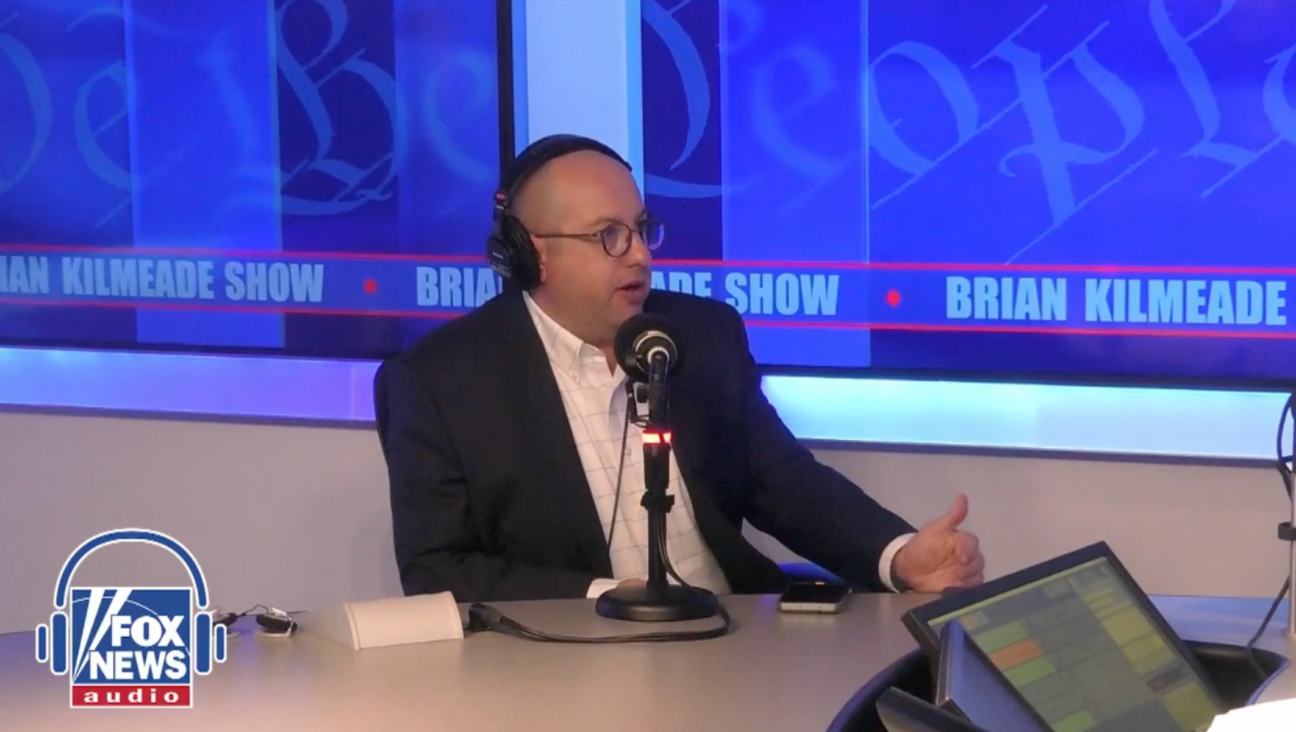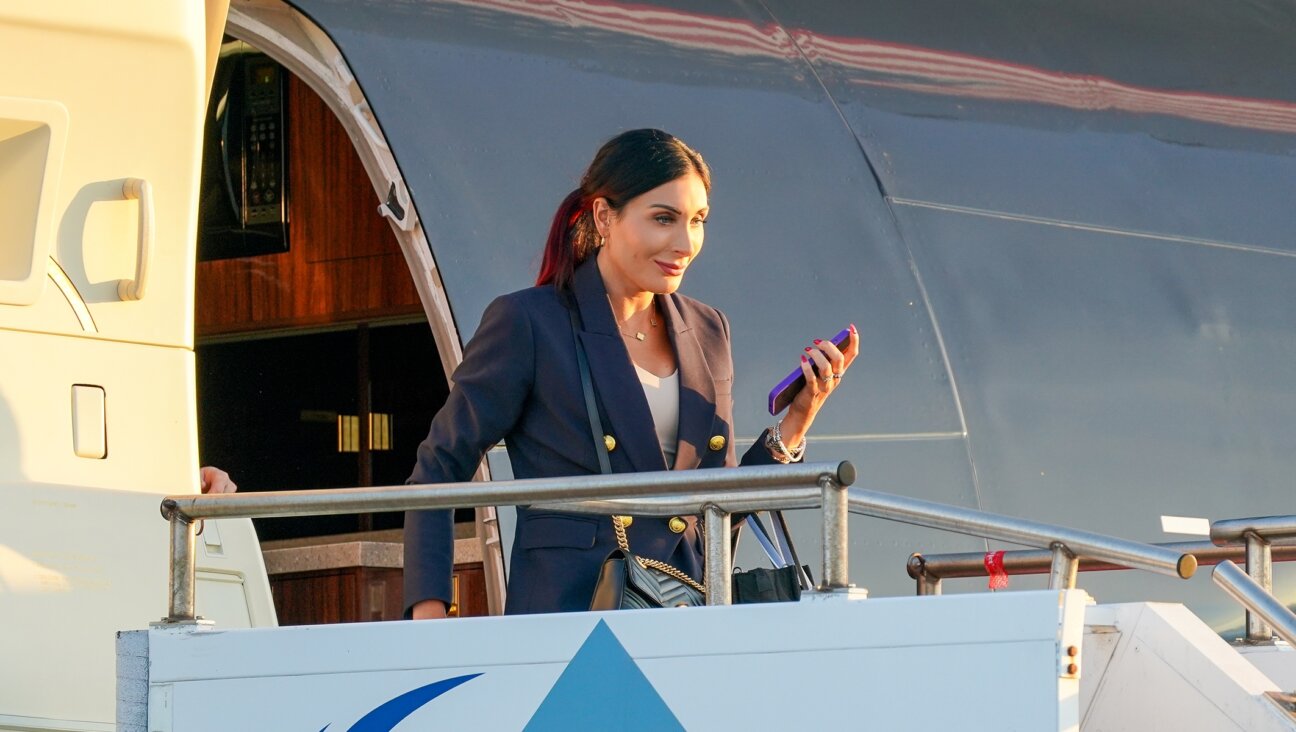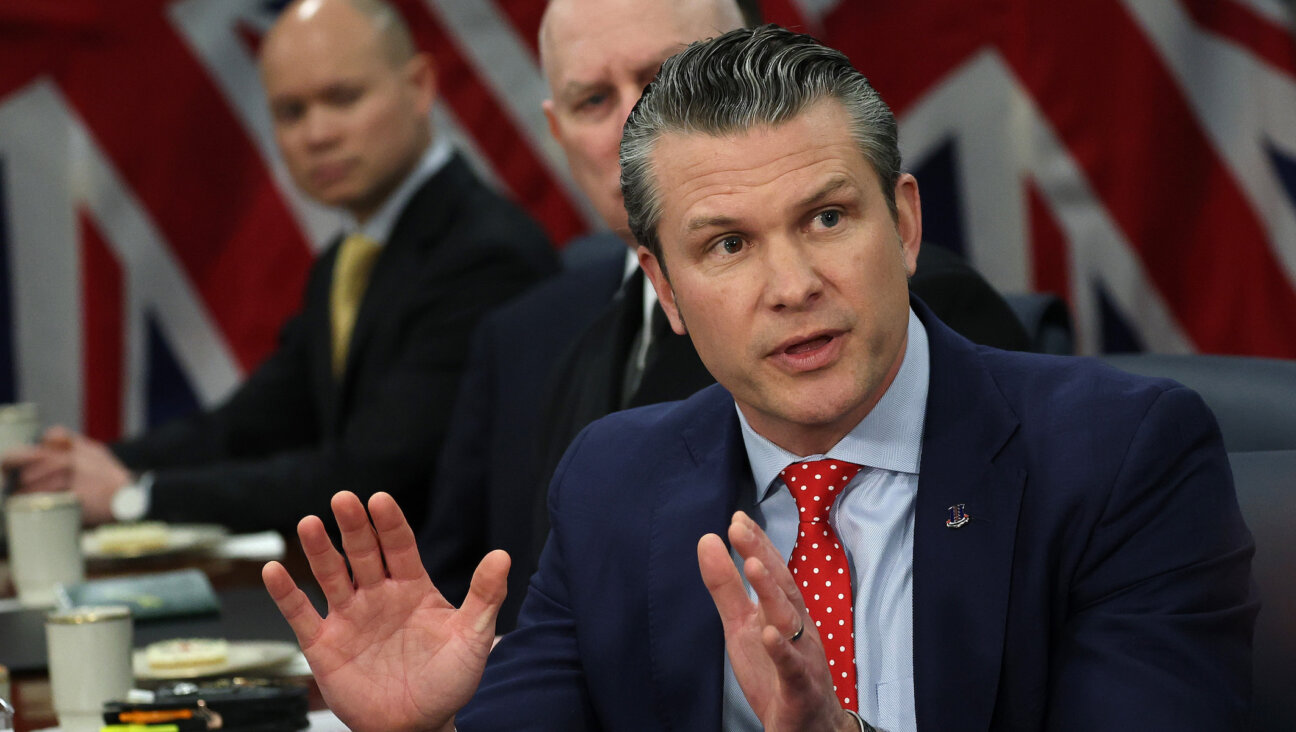Should Every Disabled Child Get a Jewish Education?

As executive director of The David Project, a pro-Israel advocacy group, David Bernstein has spent years urging Jews to raise their voices and take a stand. Recently, though, Bernstein felt isolated when he was told that his 7-year-old son, who has attention deficit hyperactivity disorder, no longer fits into the plans of the Washington-area Jewish day school he attended.
“They made clear they weren’t willing to put forward the resources to provide him the support he needs,” Bernstein said. “Imagine the rejection when the Jewish community says, ‘We will no longer provide a Jewish education to your child.’ We know a number of others facing a similar thing.”
To make things worse, Bernstein added, his son has not adjusted well to his new school.
Bernstein declined to disclose the name of his son’s Jewish school publicly. But a spokesman for the school, when reached by the Forward, said that while it has greatly increased its inclusion services, it does not have the means to accommodate every student.
“This is something the entire community needs to do better,” the spokesman said. He declined to comment on Bernstein’s son’s situation specifically, citing the school’s privacy policies.
The inability of Jewish day schools to accommodate many children with special needs is perversely democratic. It has led to the exclusion of children of influential leaders in the Jewish community and to the exclusion of those with no influence at all. And it has certainly raised the financial bar for those who can barely afford a private education for their children to begin with.
But as the number of children diagnosed with disabilities grows steadily, the Jewish educational community is being asked two vexing questions: What do parents of such children have a right to expect from Jewish schools already struggling financially? And at what price?
The problem starts with the daunting range of disabilities the schools are being asked to absorb, from mild dyslexia to profound autism, from among some 200,000 Jewish children with special needs in the United States, a number tabulated by the special needs agency Matan.
“We love Jewish day school education,” Bernstein said, referring to his own child’s case. “So it’s a balancing act; on one hand, trying to voice our distress at this direction they’ve taken, but not wanting to undermine the place of the school in the community.”
Shelley Cohen, founder and director of the Jewish Inclusion Project, is less sparing of the schools. When she tried to find a day school that would accommodate her late son, who had Duchenne muscular dystrophy, a disease that weakens its victims’ muscles, mobility and learning capabilities — and usually kills them by their 20s — she was rejected. The rejections, she said, ranged “from the pluralistic to the Reform to the Orthodox.”
One administrator tried to get her to understand the school’s dilemma. “Understand? I can never understand,” she replied. “I’m willing to accept it because I have no choice. But I can never understand.”
Eventually, Cohen found a school for her son, with help from her extended network of contacts. But some parents aren’t as well-connected as Cohen, a wealthy New York philanthropist long active in the Jewish community. They end up abandoning hope of a day school education for their child, and sometimes abandon their participation in the local Jewish community altogether.
Jeffrey Lichtman, the national director of Yachad/National Jewish Council for Disabilities, said there are three main issues to address to improve day school inclusion: rising costs, better teacher training and attitude changes among the day school establishment. He prioritized the last above all.
“What did President Clinton say? It’s the economy, stupid. Here, it’s the attitude, stupid,” Lichtman said.
Lichtman was dismayed that at the North American Jewish Day School Conference, held in February, there was ”nothing“ on special education.
“We’ve approached them on several occasions about doing more at the conference on special education and inclusion. [We] even put the entire program together, and we have been met with complete rejection,” he said. “It’s really mind-boggling to me, terribly frustrating.”
Jane West Walsh, an organizer of the conference, said that this year’s theme was “leadership,” a theme that helped address all the challenges facing the day school community.
“Everyone comes to these conferences with a different hat on,” Walsh said. “We really thought long and hard on a theme, and what we thought were the most important challenges to day school education and stability.”
Walsh, who has a child with special needs, said that in recent years, special education has been a main focus of the conference. She said that conference organizers would continue to seek out partnerships with leaders in the field.
Contrary to Lichtman, Walsh thought the biggest hurdles to greater inclusion in Jewish schools were financial, not attitudinal. “It’s not will, it’s resources,” she said. “I haven’t found any day school head that says, ‘Just leave me alone.’”
Michelle Wolf, a not-for-profit worker in Los Angeles who blogs on disability issues for the Jewish Journal, L.A.’s local Jewish news outlet, often speaks with parents who are experiencing these scenarios. Wolf herself has a child with cerebral palsy. When her son was diagnosed at 13 months, Wolf prioritized early intervention above all. When he came of school age, she didn’t even apply to Jewish day schools. “I didn’t see the point of sending him to the programs where he wouldn’t get all the therapies,” she said.
Wolf’s choice reflects a hard reality: Even schools able to absorb children with mild disabilities generally lack services for those who have severe ones.
Pardes Jewish Day School, in Phoenix, exemplifies in a lot of ways what Jewish schools can and cannot do. Like many such schools, its outer boundary for children with special needs is a moving target.
“When I came on board 10 years ago, there wasn’t any kind of program,” school head Jill Kessler said. “We were a small school with a very limited budget. We just took baby steps.”
Over the course of her tenure, Kessler has slowly built an inclusive program from scratch. That included evaluating every student about whom the staff had learning concerns, followed by hiring a part-time staff member who could do one-on-one work and train teachers. Today, Pardes’s special education program includes about 40 students.
Still, Pardes does not yet have the capability to serve students who have severe disabilities, such as those who are nonverbal or profoundly autistic.
“We don’t accept children until we’re sure we can meet all of their needs,” Kessler said.
Kessler said candidly that parents of children who have severe disabilities should place a priority on finding programs that will help their children become successful adults, even at the cost of a day school education. “If a child’s severely autistic and has no language [skills], in my mind, that child needs to be in a program designed by people and specialists who truly understand autism at its most serious to bring out and maximize that youngster’s potential,” she said. “Then maybe through the synagogue they can have experiential Jewish learning.”
Wolf, the L.A. blogger who bypassed even applying to a Jewish school for her son with cerebral palsy, noted that he nevertheless has been able to stay involved in the Jewish community. He became a bar mitzvah in 2008.
It’s difficult to analyze whether Jewish day schools are trailing other schools in providing inclusion programs. Lichtman said that on the whole, Catholic schools were not doing a better job than Jewish day schools, but the cost is different. “Day school education, to begin with, is much more expensive,” he said. “So I’m not sure, even there, that it’s a fair comparison.”
Lichtman also did not think it was fair to compare Jewish day schools with public schools, which are mandated by law to serve children who have special needs. “They have an absolute legal obligation, and nobody else does,” he said. “It’s not just a Jewish problem, for sure, but certainly on the face of things, public schools are doing much more because they have to.”
Jennifer Laszlo Mizrahi, founder and president of Laszlo Strategies, a consulting firm whose portfolio includes advocacy for children with disabilities, recently wrote an op-ed in the Forward, in which she strongly criticized the Jewish days schools’ collective performance. Inclusion has “never been made a priority in the Jewish community,” she said in a follow-up interview, while acknowledging that other faith-based communities are struggling to tackle the subject, as well.
“Imagine if that child was denied admittance because they were black; imagine if that child was denied admittance because the child was female,” said Mizrachi, who is also the parent of a child with a disability. “How would the community feel about that? Why would we allow an institution to say that the school won’t allow a person with disabilities?”
Mizrahi said she has had conversations with parents who offered full payment for inclusion services at a day school but were still met with refusal.
There are programs that appear to offer models for integrating religious and special education components. Boston’s Gateways program is often cited as one. It serves 140 students in seven day schools, providing them with on-site occupational therapists, speech and language therapists as well as learning specialists who assist throughout the day as needed. The program also trains teachers.
But Gateways charges notable fees in addition to already hefty day school tuitions. Those fees vary depending on the type of assistance needed. The program’s executive director, Arlene Remz, said weekly 30-minute speech-language therapy or occupational therapy sessions cost $1,650 per year, while a fully “supported inclusion” program costs about $16,000, not including the pay for a one-on-one aide.
Other successful programs include Keshet in Chicago, Kesher in Miami and OROT in Philadelphia. One school that is able to combine the costs by hosting all the services under one roof is Carmel Academy, a pluralistic day school in Greenwich, Conn. Carmel offers in-house special education services through its Providing Alternative Learning Strategies program, now in its seventh year. The program serves children who have language-based and other learning disabilities, as well as children on the autism spectrum, from kindergarten through eighth grade.
Though the PALS classes are mostly self-contained, kids mainstream throughout the day, both in academic classes and for extracurricular activities.
Fifty of Carmel Academy’s 320 students are enrolled in the PALS program. Bobbie Powers, who serves both as director of educational resources for the entire school and as director of the PALS division, estimated tuition for the core program at $21,000 a year; for PALS students, the cost is more than double that amount.
In Philadelphia, according to OROT’s educational director, Beverly Bernstein, parents pay $8,500 on top of tuitions that already range from $8,500 to $19,000 for OROT’s additional special needs services.
The significant financial burden weighs heavily on the day schools themselves.
“It can be challenging from a cost perspective, a resource perspective and a knowledge perspective,” said Rabbi Yehuda Potok, head of the Gateways partner Striar Hebrew Academy, located in Boston. Most day schools simply can’t afford to build the sort of internal capacity that public schools are legally mandated to construct, he said — and for which they receive federal and state funding.
Michael Held, executive director of the Etta Israel Center, an inclusive day school center in L.A., proposes a radical solution for mitigating the financial burden that agencies like OROT, PALS and Gateways now lay on parents of children with special needs: Socialize the additional cost among all families in the school community.
“If there was a community wide vision that inclusive education is the correct thing to do, then the community of schools as a whole need to embrace that and incorporate the cost in the cost of the school,” Held said.
But should parents whose children do not have special needs have to pay for those costs? “It costs more to the community to have the supports in place,” Mizrahi said. But, she argued, the richness that inclusion provides for the kids who don’t have disabilities is immense.
“The money is there if we choose to make it a priority, and we haven’t,” she said.
Contact Seth Berkman at [email protected] and Anne Cohen at [email protected]
The Forward is free to read, but it isn’t free to produce

I hope you appreciated this article. Before you go, I’d like to ask you to please support the Forward.
At a time when other newsrooms are closing or cutting back, the Forward has removed its paywall and invested additional resources to report on the ground from Israel and around the U.S. on the impact of the war, rising antisemitism and polarized discourse.
Readers like you make it all possible. We’ve started our Passover Fundraising Drive, and we need 1,800 readers like you to step up to support the Forward by April 21. Members of the Forward board are even matching the first 1,000 gifts, up to $70,000.
This is a great time to support independent Jewish journalism, because every dollar goes twice as far.
— Rachel Fishman Feddersen, Publisher and CEO
2X match on all Passover gifts!
Most Popular
- 1

News A Jewish Republican and Muslim Democrat are suddenly in a tight race for a special seat in Congress
- 2

Fast Forward The NCAA men’s Final Four has 3 Jewish coaches
- 3

Film & TV What Gal Gadot has said about the Israeli-Palestinian conflict
- 4

Fast Forward Cory Booker proclaims, ‘Hineni’ — I am here — 19 hours into anti-Trump Senate speech
In Case You Missed It
-

Fast Forward Jerusalem Post editor Zvika Klein, arrested in ‘Qatar-gate,’ says he’s being unfairly prosecuted for his reporting
-

Fast Forward Trump fires national security officials, reportedly at urging of Laura Loomer, far-right Jewish ‘Islamophobe’
-

Fast Forward Display honoring Jewish women graduates of naval academy removed ahead of Hegseth visit
-

Yiddish טשיקאַוועסן: מיידעלע געפֿינט 3,800־יאָריקע קמיע לעבן בית־שמש, ישׂראלTIDBITS: Little girl finds 3,800-year old amulet near Beit Shemesh, Israel
אַן עקספּערט פֿון פֿאַרצײַטיקע קמיעות האָט באַשטעטיקט אַז די קמיע איז געלעגן אויפֿן אָרט פֿונעם אַמאָליקן לאַנד כּנען.
-
Shop the Forward Store
100% of profits support our journalism
Republish This Story
Please read before republishing
We’re happy to make this story available to republish for free, unless it originated with JTA, Haaretz or another publication (as indicated on the article) and as long as you follow our guidelines.
You must comply with the following:
- Credit the Forward
- Retain our pixel
- Preserve our canonical link in Google search
- Add a noindex tag in Google search
See our full guidelines for more information, and this guide for detail about canonical URLs.
To republish, copy the HTML by clicking on the yellow button to the right; it includes our tracking pixel, all paragraph styles and hyperlinks, the author byline and credit to the Forward. It does not include images; to avoid copyright violations, you must add them manually, following our guidelines. Please email us at [email protected], subject line “republish,” with any questions or to let us know what stories you’re picking up.















